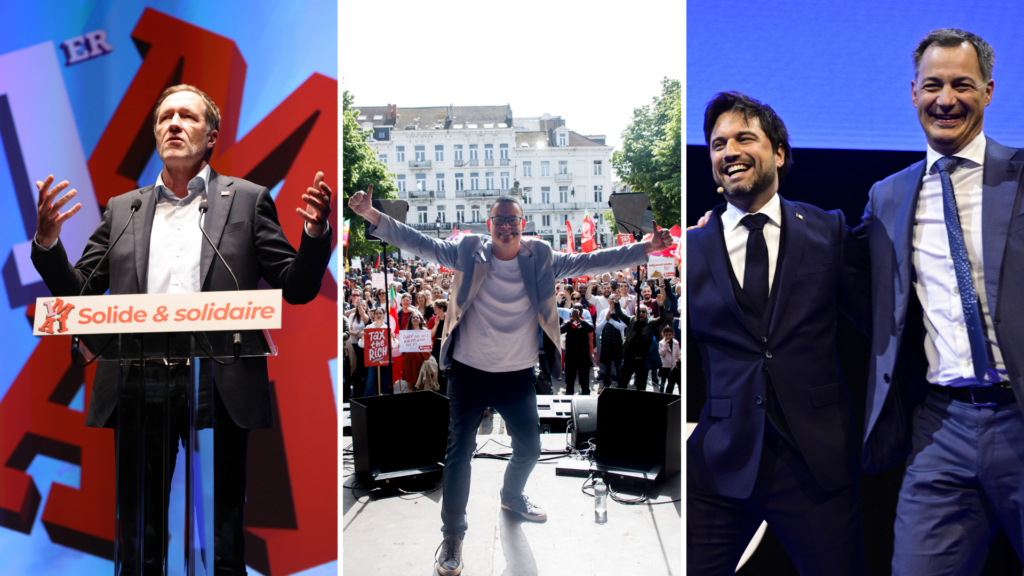May Day is traditionally a day that sees employees and unions across Europe carry out demonstrations to promote their rights and display their collective power.
To mark the occasion, many of the country's main political figures made speeches outlining how they believe Belgium's economy could be strengthened and working conditions improved. Here are the main points.
Belgian Workers' Party (PTB/PVDA)
On a day where the Belgian Workers' Party was centre stage as unions carried out demonstrations in Brussels, PTB/PVDA leader Raoul Hedebouw used his 1 May speech to address issues central to his party's election programme.
Specifically, these included calls for fairer taxes, increasing purchasing power, combating greed culture and a social climate policy. "Politics must dare to target the wealthy, rather than the ordinary people. Tax the rich!" urged Hedebouw. He also proposed a "Canada Tax" on corporate stock, which could generate an annual revenue of €2 billion.
Though the PTB was not the only party to promise fairer taxation, Hedebouw insists that only his party will make this a reality. He took aim at the Vivaldi coalition, saying that little progress has been made on this front despite five years in government. He went further, saying that Belgium is a "tax hell for ordinary people while it's a fiscal paradise for the super-rich and multinational corporations."
The proposed "Canada Tax" takes inspiration from the system in that country, which tightens up on large corporations and multinational companies which evade taxes on their massive profits from stock sales. "Engie's subsidiary made €1 billion profit from selling stocks without paying any taxes; Ackermans & van Haaren made €340 million profits tax-free," Hedebouw lamented. The PTB would address this with a 25% tax on two-thirds of the stock sale proceeds.
The party also has a central policy to tax fortunes above €5 million, which the party believes could yield €8 billion. It also would abolish VAT on food and basic products, arguing that this puts a disproportionate tax burden on people with lower incomes. Hedebouw also cited dividend payments of almost €10 billion paid by Bel20 companies last year, while no wage increases were given to their employees.
Socialist Party
The Socialist Party (PS) took the opportunity to prioritise wage increases and set stringent conditions for its involvement in a government following the 9 June elections. Speaking during May Day celebrations in Charleroi, party president Paul Magnette (who is also mayor of Charleroi) pledged to supporters that if coalition partners do not agree, "socialism won't be part of [an eventual government] ."
The PS proposed a minimum wage increase of €400, building on measures already implemented during this legislative term. This would be accompanied by a tax reform that promises a net gain of €300 for low- and middle-income earners.
Whilst leftist competitors the PTB make "Tax the rich" their slogan, PS has questioned their approach, which imposes a wealth tax on fortunes over €5 million. By contrast, PS says it would apply a similar tax but for any fortune of €1 million or more.
Reformist Movement (MR)
The leader of the Reformist Movement (MR) Georges-Louis Bouchez celebrated 1 May in Jemappes (near Mons), at the centre of the former industrial basin of Hainaut. The region has an employment rate of barely over 50%.
Speaking to over 2,000 activists at the Mons Arena, Bouchez leaned in on his background: "Having grown up about 500 metres from here I could have easily become a socialist. But I know the pitfalls: excessive social aid has crushed hope and limited the prospects of thousands of youths and children."
The MR president lambasted his former partners, the PS and Ecolo for "shadowing Raoul Hedebouw". Bouchez evoked the Marxist fundaments of the PTB and argued that this has led to "execution in dozens of countries, poverty, poor governance, and social revolt."
His distaste for his coalition partners was made clear as the economically liberal leader told his left-leaning rivals to "Take a tax break." MR plans to increase the amount exempted from tax to the amount of the first social allowance. It also would cut corporation tax for small and medium-sized enterprises with no more than 25 employees to 15%.
Related News
- A beginner's guide to Belgium's political parties
- Belgian elections guide: What Belgium's parties stand for
- Making sense of the Belgian elections
Open Vld
Speaking at the same event as Georges-Louis Bouchez, Prime Minister Alexander De Croo said that "Our country needs more liberals" and stressed the connection between the Flemish and francophone liberal parties (his own Open Vld and MR).
The Prime Minister criticised those within the country who he perceives as aiming to divide Belgium, notably the N-VA party and Bart De Wever. Rather than exaggerate regional differences, De Croo said that Flemish, Walloon and Brussels citizens share the desire to be valued in the workplace and for job-creating flexibility.
He criticised socialists, claiming their calls for a shorter 32-hour working week are unfeasible given the country's nearly 200,000 job vacancies. Instead, he said that better oversight of public spending and budgeting will ensure that Belgium remains economically strong in the future. He also stated his belief that time limits should be placed on unemployment benefits.
De Croo also praised the contributions of liberals within the Vivaldi coalition, pointing out Belgium's impressive employment rates, buying power, significantly increased economic growth and equitable wealth distribution. He said that despite the global pandemic and energy crisis, Belgium is stronger now than it was five years ago.
The Prime Minister thanked Bouchez for his work in extending the operation of Doel 4 and Tihange 3 nuclear reactors by ten years, claiming this to be a significant achievement for liberals.

